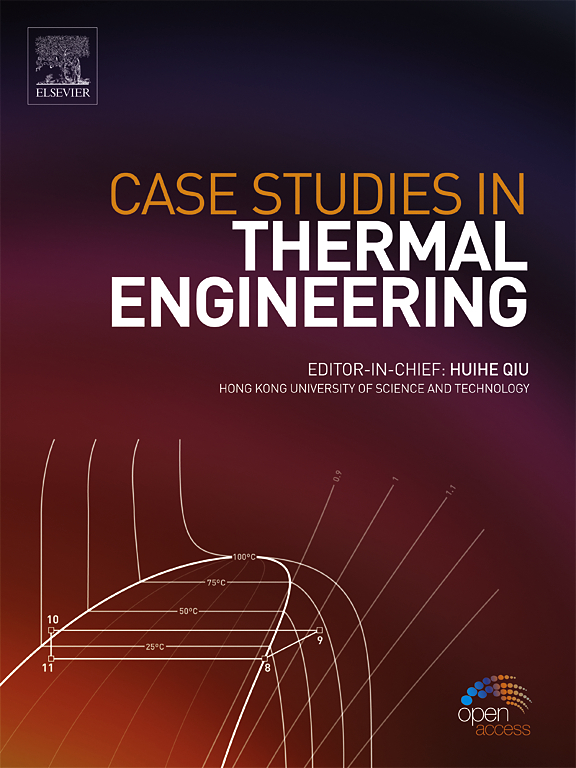Optimized physics-informed neural network for analyzing the radiative-convective thermal performance of an inclined wavy porous fin
IF 6.4
2区 工程技术
Q1 THERMODYNAMICS
引用次数: 0
Abstract
The significance of radiation and inclination on the temperature dispersion of the wavy porous fin has been addressed in the present study. Also, the influence of convection and internal heat generation on the thermal dissipation of the inclined wavy porous fin (IWPF) is examined. The pertinent temperature expression of the fin is represented using basic laws, and this equation is reduced to a dimensionless form via dimensionless variables. Additionally, a mix-encoding Genetic algorithm and Particle swarm optimization technique is shown to optimize the network hyperparameters. This resolves the issue of arbitrarily identifying the Physics informed neural networks (PINN's) ideal network and successfully limits local optimization during the training phase. Further, the equation is also resolved numerically using Runge-Kutta Fehlberg's fourth-fifth (RKF-45) scheme, and the solutions are subsequently used to verify the PINN model's applicability. The temperature results estimated by PINN and their associated RKF-45 values correlate excellently, which indicates the accuracy of the applied PINN model. The obtained findings denote that reduced measures of convective-conductive variables stimulate the IWPF's thermal distribution. An inclination angle of the fin has a significant impact on the thermal variation of the IWPF.
用于分析倾斜波浪形多孔鳍片辐射对流热性能的优化物理信息神经网络
本研究探讨了辐射和倾斜度对波浪形多孔翅片温度散布的影响。此外,还研究了对流和内部发热对倾斜波浪形多孔翅片(IWPF)散热的影响。翅片的相关温度表达用基本定律表示,并通过无量纲变量将该方程简化为无量纲形式。此外,还展示了一种混合编码遗传算法和粒子群优化技术,用于优化网络超参数。这解决了任意确定物理信息神经网络(PINN)理想网络的问题,并成功限制了训练阶段的局部优化。此外,还使用 Runge-Kutta Fehlberg's fourth-fifth (RKF-45) 方案对方程进行了数值求解,求解结果随后用于验证 PINN 模型的适用性。PINN 估算的温度结果与相关的 RKF-45 值非常吻合,这表明所应用的 PINN 模型非常准确。研究结果表明,对流-传导变量的减少会刺激 IWPF 的热分布。翅片的倾斜角度对 IWPF 的热变化有显著影响。
本文章由计算机程序翻译,如有差异,请以英文原文为准。
求助全文
约1分钟内获得全文
求助全文
来源期刊

Case Studies in Thermal Engineering
Chemical Engineering-Fluid Flow and Transfer Processes
CiteScore
8.60
自引率
11.80%
发文量
812
审稿时长
76 days
期刊介绍:
Case Studies in Thermal Engineering provides a forum for the rapid publication of short, structured Case Studies in Thermal Engineering and related Short Communications. It provides an essential compendium of case studies for researchers and practitioners in the field of thermal engineering and others who are interested in aspects of thermal engineering cases that could affect other engineering processes. The journal not only publishes new and novel case studies, but also provides a forum for the publication of high quality descriptions of classic thermal engineering problems. The scope of the journal includes case studies of thermal engineering problems in components, devices and systems using existing experimental and numerical techniques in the areas of mechanical, aerospace, chemical, medical, thermal management for electronics, heat exchangers, regeneration, solar thermal energy, thermal storage, building energy conservation, and power generation. Case studies of thermal problems in other areas will also be considered.
 求助内容:
求助内容: 应助结果提醒方式:
应助结果提醒方式:


